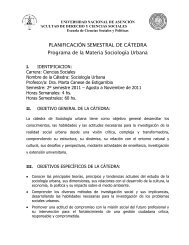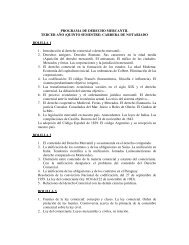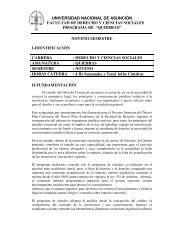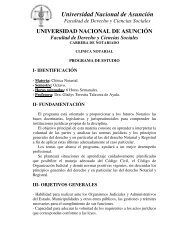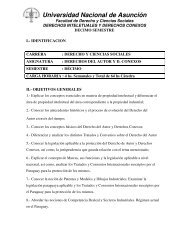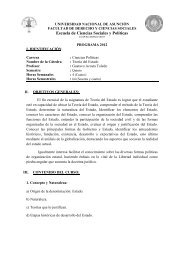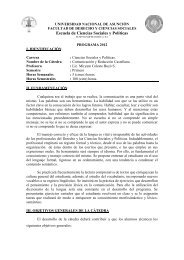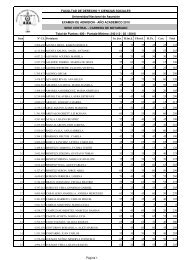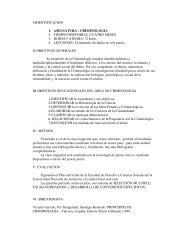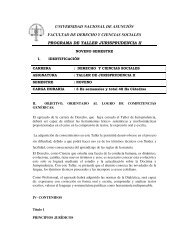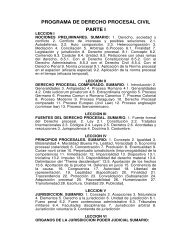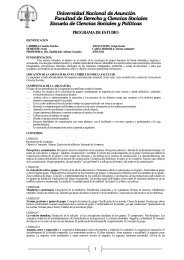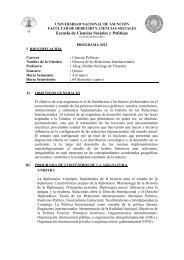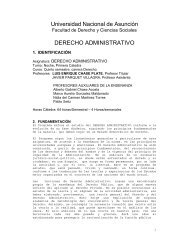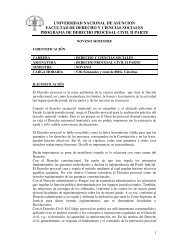Derecho Tributario Notarial - Facultad de Derecho
Derecho Tributario Notarial - Facultad de Derecho
Derecho Tributario Notarial - Facultad de Derecho
You also want an ePaper? Increase the reach of your titles
YUMPU automatically turns print PDFs into web optimized ePapers that Google loves.
IV.- Analizar la actuación y responsabilidad <strong>de</strong>l Escribano Público como sujeto obligado.<br />
CONTENIDO: Antece<strong>de</strong>ntes y características <strong>de</strong> este impuesto. Descripción <strong>de</strong>l hecho imponible.<br />
Los contribuyentes. El nacimiento <strong>de</strong> la obligación tributaria y la <strong>de</strong>terminación <strong>de</strong> la base<br />
imponible. Liquidación y pago <strong>de</strong>l impuesto. La tasa <strong>de</strong>l impuesto. Exoneraciones. La<br />
documentación <strong>de</strong> las operaciones. El crédito fiscal <strong>de</strong>l exportador.<br />
UNIDAD XVII<br />
EJE TEMATICO: IMPUESTOS AL CONSUMO. IMPUESTO SELECTIVO AL CONSUMO. LEY 125/91<br />
Y LEY 2421/04.<br />
OBJETIVOS:<br />
I.- Precisar el concepto <strong>de</strong> Impuesto Selectivo al Consumo, sus antece<strong>de</strong>ntes en la legislación<br />
nacional, sus características principales, hechos imponibles, base imponible, contribuyentes y tasas<br />
<strong>de</strong> este impuesto en la legislación vigente.<br />
II.- Diferenciar este impuesto <strong>de</strong>l Impuesto al Valor Agregado<br />
III.- Explicar el sistema, forma <strong>de</strong> pago y <strong>de</strong> control.<br />
CONTENIDO:<br />
Antece<strong>de</strong>ntes y características <strong>de</strong> este impuesto. Descripción <strong>de</strong>l hecho imponible. Los<br />
contribuyentes. Nacimiento <strong>de</strong> la obligación tributaria. La base imponible. Merca<strong>de</strong>rías gravadas y<br />
tasas impositivas. Liquidación y pago <strong>de</strong>l impuesto. Instrumentos <strong>de</strong> control y otras medidas <strong>de</strong><br />
contralor. Obligaciones <strong>de</strong> los contribuyentes y los terceros. Parecido y diferencias con el IVA. El<br />
escribano público como contribuyente y como responsable.<br />
UNIDAD XVIII<br />
EJE TEMATICO: IMPUESTO A LA RENTA DEL SERVICIO DE CARÁCTER PERSONAL. LEY<br />
2421/04.<br />
OBJETIVOS:<br />
I.- Precisar el concepto <strong>de</strong> Impuesto a la Renta <strong>de</strong>l Servicio <strong>de</strong> Carácter Personal, el hecho<br />
imponible general, los contribuyentes y las tasas <strong>de</strong> este impuesto en la legislación vigente.<br />
II.- Precisar los criterios <strong>de</strong> Renta Bruta, Renta Neta y Renta Presunta como elementos para la<br />
<strong>de</strong>terminación <strong>de</strong> la base imponible y la aplicación <strong>de</strong> la tasa o tarifa <strong>de</strong>l impuesto.<br />
III.- Explicar el sistema y forma <strong>de</strong> pago<br />
IV.- Analizar la actuación y responsabilidad <strong>de</strong>l Escribano Público como sujeto obligado<br />
CONTENIDO: Introducción y características <strong>de</strong>l sistema tributario. Descripción <strong>de</strong>l Hecho<br />
Imponible. Contribuyentes y nacimiento <strong>de</strong> la obligación tributaria. Los servicios <strong>de</strong> Carácter<br />
Personal. La renta bruta, la presunción <strong>de</strong> renta imponible y la renta neta. La <strong>de</strong>terminación <strong>de</strong> la<br />
renta imponible. Liquidación y pago <strong>de</strong>l impuesto. La tasa <strong>de</strong>l impuesto y el pago por anticipos.<br />
Exoneraciones. El escribano público como contribuyente y como responsable.<br />
UNIDAD XIX<br />
EJE TEMATICO: LAS EXONERACIONES DE LEYES ESPECIALES Y EL REGIMEN TRIBUTARIO<br />
INTERNACIONAL.<br />
OBJETIVOS:<br />
I.- Diferenciar los conceptos <strong>de</strong> exoneración y exceptuación<br />
II.- Exponer las exoneraciones previstas en la legislación nacional vigente.<br />
III.- Explicar los regímenes tributarios especiales previstos en los más importantes Tratados<br />
Internacionales: Itaipú, Yacyretá, Cuenca <strong>de</strong>l Plata, ALADI, MERCOSUR.<br />
CONTENIDO: Las exoneraciones en la Constitución Nacional. Las exoneraciones en leyes<br />
especiales: Ley 302/93 <strong>de</strong> donaciones a favor <strong>de</strong>l Estado y otras Instituciones. Cuerpo Diplomático<br />
y Consular. Organismos Internacionales. Ley <strong>de</strong> Inversión <strong>de</strong> Capitales. Excombatientes <strong>de</strong> la<br />
Guerra <strong>de</strong>l Chaco. Cooperativas. El régimen impositivo <strong>de</strong> Itaipú y Yacyretá. Cuenca <strong>de</strong>l Plata.<br />
ALADI. MERCOSUR.<br />
UNIDAD XX<br />
EJE TEMATICO: LAS TASAS Y LAS CONTRIBUCIONES EN LA LEGISLACION NACIONAL. LA<br />
EXPLOTACION MINERA Y EL REGIMEN DE HIDROCARBUROS.



